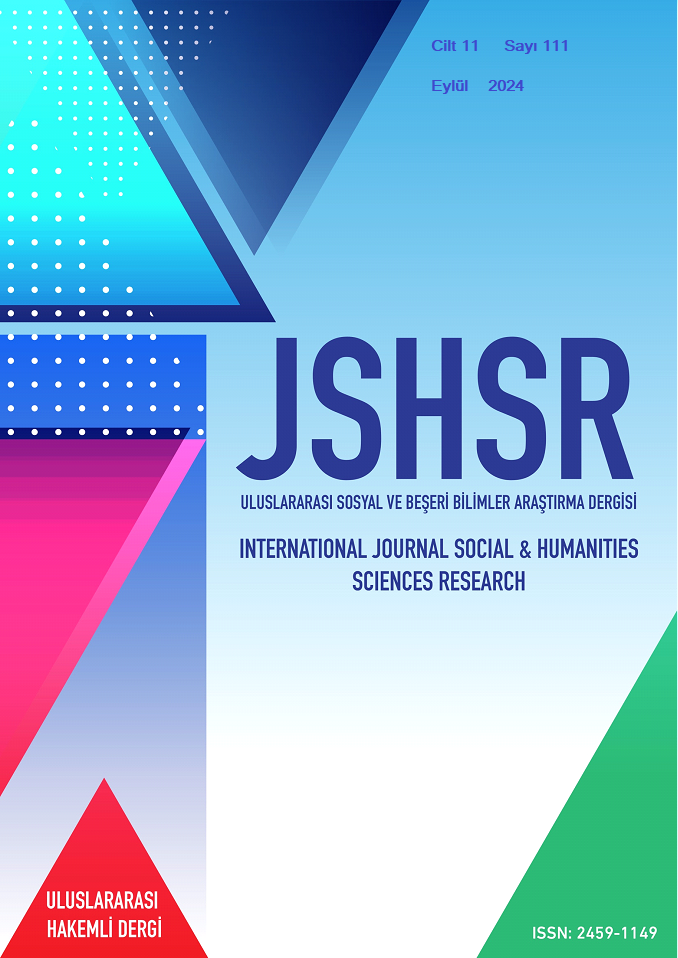Safety Behavior in the Logistics Sector: The Moderating Role of the Mindful Organization
DOI:
https://doi.org/10.5281/zenodo.13864149Keywords:
Empowering Leadership, Safety Behavior, Mindful OrganizingAbstract
In this study, the relationships among empowering leadership, safety behavior and mindful organization were examined. The research was conducted with personnel working in firms actively engaged in the logistics sector. The aim of the study was to determine the impact of leadership characteristics on safety behaviors and to assess the moderating role of mindful organization in this relationship. A survey method was used as the data collection tool, and the obtained data were analyzed using Structural Equation Modeling (SEM) through the Statistical Package for the Social Sciences (SPSS) software. The research findings did not support the moderating role of mindful organization. On the other hand, a positive and significant relationship was found between empowering leadership’s performance-based trust dimension and safety behavior. These results underscore the importance of performance-based trust in promoting safety behavior within organizations and indicate that the effects of the other investigated variables are limited.
References
Ahearne, M., Mathieu, J. E., Rapp, A. (2005). To Empower or Not to Empower Your Sales Force? An Empirical Examination of the Influence of Leadership Empowerment Behavior on Customer Satisfaction and Performance. Journal of Applied Psychology, 90(5), 945–955.
AlShemeili, H., Davidson, R., Khalid, K. (2022). Impact of Empowering Leadership on Safety Behavior and Safety Climate: Mediating and Moderating Role of Safety Monitoring. Journal of Engineering Design and Technology. 22(4).
Asamani, L. (2020). Promote Safety Culture and Enhance Safety Performance through Safety Behaviour. European Journal of Business and Management Research, 5(4).
Buranapin, S., Limphaibool, W., Jariangprasert, N., Chaiprasit, K. (2023). Enchancing Organizational Resilience through Mindful Organizing. Sustainability, 15(3):2681, 1-14.
Choi, S., & Lee, S. (2020). The Impact of Safety Management Practices on Safety Performance in The Logistics Industry. Safety Science, 129, 104817.
Christopher, M. (2016). Logistics & Supply Chain Management. Pearson UK.
Clarke, S. (2006). The Relationship Between Safety Climate and Safety Performance: A Meta-Analytic Review. Journal of Occupational Health Psychology, 11(4), 315-327.
Clarke, S. (2012). The Effect of Challenge and Hindrance Stressors on Safety Behavior and Safety Outcomes: A Meta-Analytic Review. Journal of Occupational Health Psychology, 17(4), 387-97.
Çekmecelioğlu, H. G. (2014). Göreve ve İnsana Yönelik Liderlik Tarzlarının Örgütsel Bağlılık, İş Performansı ve İşten Ayrılma Niyeti Üzerindeki Etkileri. Kocaeli Üniversitesi Sosyal Bilimler Dergisi, (28), 21-34.
Düger, Y. S. (2021). The Effect of Empowering Leadership on Employees’ Innovative Behavior: The Role of Affective Commitment and Psychological Empowerment. Pamukkale Üniversitesi Sosyal Bilimler Enstitüsü Dergisi (46), 479-496.
Gajda, D., Zbierowski, P. (2022). Exploring The Consequences of Mindfulness At Work: The Impact of Mindful Organizing on Employee Attitudes and Behavior Toward Work and Organization. Personnel Review, Vol. 52 No. 9, pp. 2342-2362.
Gracia, F. J., Tomás, I., Martinez-Córcoles, M., Peiró, M. J. P. (2020). Empowering Leadership, Mindful Organizing and Safety Performance in a Nuclear Power Plant: A Multilevel Structural Equation Model. Safety Science, 123.
Hieu, V. M. (2020). Employee Empowerment and Empowering Leadership: A Literature Review. Technium, Vol. 2, 20-28.
Hofmann, D. A., & Stetzer, A. (1996). A Cross-Level Investigation of Factors Influencing Unsafe Behaviors and Accidents. Personnel Psychology, 49(2), 307-339.
Jin, M., Lee, J., Lee, M. (2017). Does Leadership Matter in Diversity Management? Assessing The Relative Impact of Diversity Policy and Inclusive Leadership in The Public Sector. Leadership & Organization Development Journal, 38(2), 303-319.
Lee, Y., Lu, Yang, C.C., Chang, G. (2019). A Multilevel Approach on Empowering Leadership and Safety Behavior in the Medical Industry: The Mediating Effects of Knowledge Sharing and Safety Climate. Safety Science, 117, 1-9.
Martinez-Córcoles, M., Vogus, T. J. (2020). Mindful Organizing for Safety. Safety Science, 124 (1), 1-5.
Neal, A., Griffin, M. (2006). A Study of the Lagged Relationships Among Safety Climate, Safety Motivation, Safety Behavior, and Accidents at the Individual and Group Levels. Journal of Applied Psychology, Vol. 91, No.4, 946-953.
Northouse, P. G. (2018). Leadership: Theory and Practice (8th ed.). Sage Publications.
Petitta, L., Martinez-Córcoles, M. (2022). A Conceptual Model of Mindful Organizing for Effective Safety and Crisis Management. The Role of Organizastional Culture. Current Psychology, 42, 25773-25792.
Renecle, M., Tomas, I., Gracia, F. J., Peiró, J. M. (2020). Spanish Validation of the Mindful Organizing Scale: A Questionnaire For The Assessment of Collective Mindfulness. Accident Analysis and Prevention, 134.
Sharma, P. N., & Kirkman, B. L. (2015). Leveraging Leaders: A Literature Review and Future Lines of Inquiry for Empowering Leadership Research. Group & Organization Management, 40, 193-237.
Spreitzer, G. M. (2007). Taking Stock: A Review of More Than Twenty Years of Research on Empowerment At Work. The Handbook of Organizational Behavior, 54-72.
Ta, M. T. D., Kim, T., Gausdal, A. H. (2022). Leadership Styles and Safety Performance in High-Risk Industries: A Systematic Review. Safety and Reliability, 41(1), 10-44.
Zohar, D. (2000). A Group-Level Model of Safety Climate: Testing The Effect of Group Climate on Microaccidents in Manufacturing Jobs. Journal of Applied Psychology, 85(4), 587-596.
Zohar, D., & Luria, G. (2003). The Use of Supervisory Practices as Leverage to Improve Safety Behavior: A Cross-Level Intervention Model. Journal of Safety Research, 34(5), 567-577.
Downloads
Published
How to Cite
Issue
Section
License
Copyright (c) 2024 INTERNATIONAL JOURNAL OF SOCIAL HUMANITIES SCIENCES RESEARCH

This work is licensed under a Creative Commons Attribution 4.0 International License.


